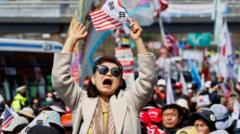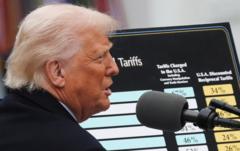The ruling presents both a sigh of relief for many South Koreans and a looming sense of political polarization as the country prepares for a crucial election.
**South Korea’s Political Shift: The Aftermath of Yoon Suk Yeol’s Impeachment**

**South Korea’s Political Shift: The Aftermath of Yoon Suk Yeol’s Impeachment**
As Yoon Suk Yeol exits the presidency, the nation faces a deeply divided landscape.
In a historic turn of events, South Korea's President Yoon Suk Yeol has been officially removed from office, following a decisive unanimous vote from the Constitutional Court to uphold his impeachment. Yoon's tenure came to an end after he attempted to impose martial law last December, a controversial decision that has left deep scars within the nation's political psyche. Court sessions early on December 3rd saw Yoon attempt to mobilize military forces to dissolve parliament, a move that sparked immediate outrage and ultimately led to his impeachment by parliament just weeks later.
Friday’s court ruling has elicited mixed emotions across South Korea—scenes of jubilation from critics of Yoon, juxtaposed with expressions of sorrow from his supporters who gathered in various parts of Seoul. The consensus among many citizens is that the path to recovery and progress begins with electing a new leader by June 3, but the echoes of Yoon’s controversial governance remain. His attempted military coup, although short-lived, unearthed fears of a possible regression to South Korea’s dictatorial past.
Moon Hyung-bae, the acting president of the Constitutional Court bench, condemned Yoon’s authoritarian measures, emphasizing that the invocation of martial law seriously undermined citizens' fundamental political rights and the principles underpinning democracy. This ruling has also ignited discussions surrounding constitutional reforms aimed at preventing future presidential overreach. Yet, reducing presidential powers will require a leader of extraordinary conviction—willing to diminish their own authority in the face of political risks.
As Yoon departs, he leaves behind not just a country in turmoil, but one more polarized than ever. While many rallied against his military attempt, his narrative has gained traction among factions who now view him as a political martyr, alleging conspiracies against him involving foreign powers. His claims have fostered a surge in far-right activism, demonstrating increasing public skepticism toward established institutions, including the court that removed him from power.
With polarizing sentiments rampant in the lead-up to a pivotal election, anxiety looms over the potential outcomes. Trust in the electoral system and the judiciary seems to be deteriorating, with a significant proportion of the population questioning the legitimacy of both. Amidst this climate of suspicion, South Korea's urgent need for a unifying figure who can lead the nation effectively becomes paramount. The new leader will not only face domestic challenges but will also have to contend with international stakes, especially regarding relations with the United States and North Korea.
The turbulence of Yoon’s presidency has set the stage for a critical next chapter in South Korea’s democratic journey. As calls for political unity resound amidst deepening divisions, South Korea must grapple with the immediate need for stabilization while confronting the specter of its recent past and an uncertain future.
Friday’s court ruling has elicited mixed emotions across South Korea—scenes of jubilation from critics of Yoon, juxtaposed with expressions of sorrow from his supporters who gathered in various parts of Seoul. The consensus among many citizens is that the path to recovery and progress begins with electing a new leader by June 3, but the echoes of Yoon’s controversial governance remain. His attempted military coup, although short-lived, unearthed fears of a possible regression to South Korea’s dictatorial past.
Moon Hyung-bae, the acting president of the Constitutional Court bench, condemned Yoon’s authoritarian measures, emphasizing that the invocation of martial law seriously undermined citizens' fundamental political rights and the principles underpinning democracy. This ruling has also ignited discussions surrounding constitutional reforms aimed at preventing future presidential overreach. Yet, reducing presidential powers will require a leader of extraordinary conviction—willing to diminish their own authority in the face of political risks.
As Yoon departs, he leaves behind not just a country in turmoil, but one more polarized than ever. While many rallied against his military attempt, his narrative has gained traction among factions who now view him as a political martyr, alleging conspiracies against him involving foreign powers. His claims have fostered a surge in far-right activism, demonstrating increasing public skepticism toward established institutions, including the court that removed him from power.
With polarizing sentiments rampant in the lead-up to a pivotal election, anxiety looms over the potential outcomes. Trust in the electoral system and the judiciary seems to be deteriorating, with a significant proportion of the population questioning the legitimacy of both. Amidst this climate of suspicion, South Korea's urgent need for a unifying figure who can lead the nation effectively becomes paramount. The new leader will not only face domestic challenges but will also have to contend with international stakes, especially regarding relations with the United States and North Korea.
The turbulence of Yoon’s presidency has set the stage for a critical next chapter in South Korea’s democratic journey. As calls for political unity resound amidst deepening divisions, South Korea must grapple with the immediate need for stabilization while confronting the specter of its recent past and an uncertain future.


















